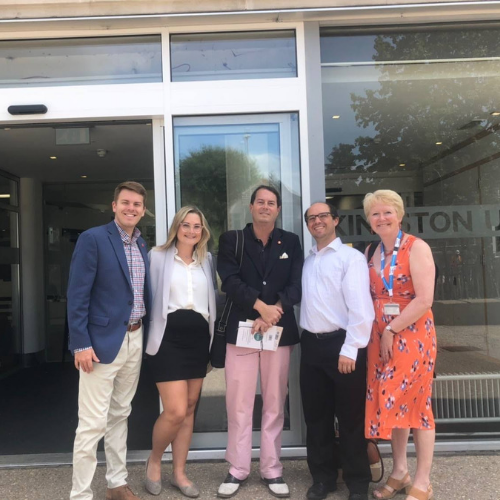
Left to right: Daniel Reed, Baily Bracken, Prof. K.B. Melear, Brandon McLeod, Prof. Alison Baverstock.
UM Higher Education PhD Student Brandon McLeod is one of three students, who participated in the summer session Comparative Higher Education class in London with SOE Professor K.B. Melear.
“The class is an immersion experience, and the corpus of the work takes place in England,” Melear said. “The course offers students an opportunity to meet with administrators, professors, and students, explore British institutions and culture, take day trips to Cambridge, Oxford, and other locales, become very familiar with London, and gain a deep understanding of United Kingdom higher education as compared to the United States and the world.”
McLeod shares his insights, tips, and advice for students interested in taking the course in the future. His experience was unique in the sense that he was able to make a UM connection while studying abroad.
Q. Why did you want to do the study abroad course?
A. Comparative Higher Education is a research interest for me, so I had to jump at the opportunity. I also have always wanted to study abroad. It was not something I was able to do as an undergrad or in my previous graduate programs. For my field, studying abroad is a valuable professional development asset. More than that though, it is an opportunity to go outside of one’s comfort zone, learn about one’s self and the world, and expand one’s horizon.
Q. What was the most surprising thing you did or saw?
A. Probably the most surprising thing was actually meeting someone whose spouse had studied abroad at the University of Mississippi in the 90s. I met him in a pub my second or third night in London and it was wild how small the world suddenly was.
Additionally, I ended up being able to meet up with a couple of friends from Japan who now live in London. I was able to visit their home in the suburbs and stay with them one night. We hadn’t seen each other in six years, so it was great catching up and, since they both attended universities in the UK, I was able to learn about their experiences as students there. I was also lucky enough to be able to attend London’s 50th Pride Parade. It was a blast, but the size of the crowd was overwhelming. It took almost 40 minutes to get from the train out of the station. Despite the crowd and the heat (and the fact that the parade alone is five hours, which is a long time to stand on the street), everyone was lovely. No one was getting angry or upset, there was no shoving or complaining. Everyone was just happy to be there. It was great.
Q. What was the one thing you expected that wasn’t actually true?
A. I expected the city to be more crowded than it was. It’s a city of 11 million, but it’s loaded with parks and open spaces. I only ever felt crowded at the Pride Parade, which they anticipated brought in an extra million plus people to the city. I also expected the iconic schools of Oxford and Cambridge to have avoided the horrible architecture of the 60s-80s, but unfortunately I was wrong about that.
Q. What was the most interesting thing you learned about the culture?
A. One of the things I found rather surprising about London culture in particular was how eclectic and international it was. Walking on the street (I averaged 8 to 10 miles per day) I was as likely to hear non-English speakers as I was English speakers. Of course, this varied wildly on area, but it even out throughout the day. I also learned that some of the more traditional pubs only have food on Sunday. So, if you head over to the Lord John Russell, don’t expect anything but pub snacks if it’s a weekday!
Q. What advice would you give other graduate students interested in Comparative Higher Education class in London?
A. Try to do as much local stuff as you can while you’re there. Avoid the chains like the plague, especially the US ones. You can get US chain food practically anywhere in the world, take the opportunity to really mix with local Londoners. I met the most interesting people that way and made some great contacts at several universities. If you’re really interested in Comparative Higher Education, it’s an important networking opportunity. Also, prepare as much as you can ahead of time. Of course you should read the textbooks, but you should also research the different colleges you may want to visit and reach out to some of them. I was able to have extended meetings with both University of Westminster and Imperial College because of being proactive.
Q. Anything else you would like to add?
A. The Comparative Higher Education course is a great way to inform your practices in your current/future positions in the university. You are really only limited by your imagination (and geography) in regards to what you can learn in this course. By taking advantage of the opportunities as they arise (and many will arise while you are there) and being proactive, you can learn a great deal about the differences in the US and English systems and make great contacts. You never know what the future holds for you. As for the presentation and paper, try to choose a country that you have a profound interest in. It will make the research go much more smoothly and you’ll be more enthusiastic in your presentation. Moreover, by being able to contrast what you are learning against your own experiences in the US and a third country, you get a better understanding of how the many moving pieces fit together.
By Veronica Crawford
